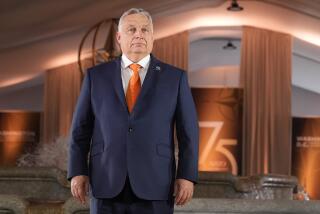Hungarian Asks U.S. Help for Reform Plan
- Share via
WASHINGTON — Sounding more like a Republican than a Communist, Hungarian leader Karoly Grosz openly appealed Tuesday for U.S. understanding and support for his political reforms and moves toward a more entrepreneurial economic system, the most ambitious of any Central European state.
The new head of Hungary’s Communist Party, who is also the nation’s premier, spoke of fostering the free flow of capital, wanting “more democracy” and creating a market economy in which state funds would be used only when the private market could not satisfy the need.
After his address to the National Press Club, Grosz was asked what will remain communist about Hungary. Communism is a distant ideal goal, while Hungary today is and will remain a socialist nation, he replied, adding, “Marx said socialism is a bit of capitalism under communist conditions.”
Seeking U.S. Attitudes
Halfway through a 10-day trip to the United States, the first by a Hungarian leader in over four decades, Grosz said his purpose was to discover American attitudes toward Hungary’s economic plight.
“How you see our purposes, our searching for our own national solutions; how much we can count on the sympathies of the United States for enhancing social, economic and political contacts. . . . Please help us in this endeavor.”
U.S. relations with Hungary are among the best with a Soviet Bloc nation, according to a senior Administration official, and doors have been opened to Grosz.
He met with Secretary of State George P. Shultz on Tuesday and will lunch with President Reagan today. He has met with Democratic presidential nominee Michael S. Dukakis and will visit with Vice President George Bush. Also planned are sessions with key Administration financial, economic and commerce officials, congressional leaders and the chiefs of international monetary and banking institutions.
The United States is inclined to be helpful to Grosz because it views Hungary to be “on the cutting edge of reform in Eastern Europe,” the senior Administration official said. The outcome of Grosz’s efforts will affect the other nations in the region, including the Soviet Union, which are seeking to carry out similar reforms.
But Grosz, while a tough-talking reformer, is not considered a “liberal.” Like Soviet leader Mikhail S. Gorbachev, whom he visited just before coming to the United States, Grosz “is a convinced Communist who believes the system can be made to work,” the U.S. official said.
During his speeches here, Grosz has made clear his support for continued Hungarian membership in the Warsaw Pact, limits on individual freedom and opposition to a multi-party system.
Grosz, 58, succeeded Janos Kadar two months ago in a peaceful transfer of power. He inherited a moribund economy with a foreign debt of $19 billion that is the highest per capita in the Communist Bloc, a high inflation rate and few goods that are competitive in the West.
He implicitly blamed Kadar for Hungary’s plight by claiming that the nation’s economic growth, produced by the innovative economic reforms that Kadar introduced in 1968, “came to a standstill because political reforms did not follow.”
Grosz’s 11 reform packages, intended to change the political as well as economic face of Hungary, are expected to create profound dislocations in coming years. Fully 25% of the nation’s work force is expected to change jobs within the next decade, he has said.
More to Read
Sign up for Essential California
The most important California stories and recommendations in your inbox every morning.
You may occasionally receive promotional content from the Los Angeles Times.













